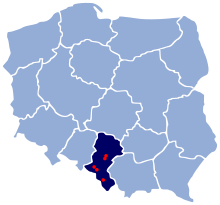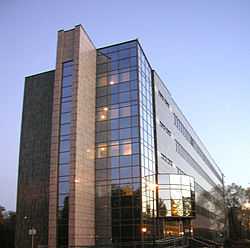University of Silesia
| The University of Silesia in Katowice | |
|---|---|
| Uniwersytet Śląski w Katowicach | |
 | |
| Latin: Universitas Silesiensis | |
| Established | 8th June 1968 |
| Type | Public |
| Rector | Prof. dr hab. Wiesław Banyś |
| Academic staff | 2 057[1] |
| Students | 32 268 |
| Postgraduates | 3 788 |
| Location | Katowice, Poland (EU) |
| Campus | Katowice, Sosnowiec, Cieszyn, Chorzów, Rybnik |
| Affiliations | LLP/Erasmus, Socrates-Lingua, Leonardo da Vinci 2, CEEPUS, CIRCEOS, IAU, CRE, AUDEM, IAUP, CBUR |
| Website | http://www.us.edu.pl |

The University of Silesia in Katowice (Polish: Uniwersytet Śląski w Katowicach, UŚ) is an autonomous state-run university in Silesia Province, Katowice, Poland.[2]
The University of Silesia in Katowice should not be confused with a similarly named university in the Czech Republic, i.e. the Silesian University in Opava (Slezská univerzita v Opavě).
The University of Silesia in Katowice conducts education and research. It offers undergraduate and Master's programs, PhD studies, as well as postgraduate, postdoctoral research - habilitation, continuous education and training programs.
History
The University of Silesia in Katowice has its origins in the Institute of Education in Katowice (Instytut Pedagogiczny w Katowicach), which was founded in 1928; at that time it was the only institution of higher education in the part of Silesia belonging to Poland. In 1950 Higher School of Education in Katowice(Wyższa Szkoła Pedagogiczna w Katowicach) was established. Later, the school merged with a established in 1965 in Katowice branch of the Jagiellonian University in Kraków. In 1968 on the base of these educational facilities, the University of Silesia in Katowice was established in its current form, as the ninth university in Poland.
Location






Uniwersytet Śląski w Katowicach has faculties in five cities in the region: Katowice, Sosnowiec, Cieszyn, Chorzów and Rybnik. The majority of faculties are in Katowice; the main campus is in Katowice city center.
The university is in the center of a highly urbanized and ethnically complex region — the Metropolitan Association of Upper Silesia. Heavy industry exerts a significant influence, and ecological challenges are formidable. The university tries to maintain close links with local industries and Silesian traditions.
Facts and figures
- Number of teachers: 2 052
- Number of students: 32 268
- Number of faculties: 13
- Number of institutes: 23
- Number of departments: 75
- Number of inter-faculty units: 15
International agreements
The university signed Agreements of Cooperation with number of foreign universities, including Free University of Brussels, Karl-Franzens University of Graz, University of Banja Luka, Université du Québec à Montréal, Heilongjiang Academy of Agricultural Sciences, University of Zagreb, Ostravá University, Silesian University in Opava, Masaryk University, Aarhus University, University of Paris III: Sorbonne Nouvelle, University of Leipzig, University of Dortmund, University of Trieste, Aristotle University of Thessaloniki, M. V. Lomonosov Moscow State University, and others.
International teaching units
- The Silesian International Business School was set up in 1991 as a joint enterprise of the Academy of Economics and the University of Silesia, in collaboration with École Supérieure de Commerce in Toulouse (France), University of Strathclyde (UK) and other European academic institutions. The main idea behind its establishment was to provide the most gifted students with an opportunity to carve out a career suitable to their potential capabilities.
- The International School of Political Science was set up 10 years ago, its main objective being education in the field. The institution plays a significant role in the academic cooperation between Poland and France. The system of instruction is modeled on institutes of political science in France. It is the first undertaking of this kind in Central Europe.
Faculties
The University of Silesia in Katowice has schools of modern languages, natural science, technology and a language teacher training college.
It is divided into the following faculties:
- Faculty of Earth Science
- Faculty of Computer and Materials Science
- Faculty of Philology
- Faculty of Mathematics, Physics and Chemistry
- Faculty of Law and Administration
- Faculty of Biology and Environmental Protection
- Faculty of Social Sciences
- Faculty of Pedagogics and Psychology
- Krzysztof Kieślowski Faculty of Radio and Television, also named Katowice Film School or Krzysztof Kieślowski Film School in Katowice
- Faculty of Theology
- Faculty of Art
- Faculty of Ethnology and Sciences of Education
Rectors
- prof. dr hab. Kazimierz Popiołek (1968-07-02 – 1972-09-30)
- prof. dr hab. Henryk Rechowicz (1972-10-01 – 1980-07-05)
- prof. dr hab. Sędzimir Klimaszewski (1980-12-05 – 1980-12-15, 1980-12-16 – 1981-09-30, 1982-06-01 – 1984-09-30, 1984-10-01 – 1987-09-30, 1987-10-01 – 1990-11-30)
- prof. dr hab. August Chełkowski (1981-10-01 – 1982-01-16)
- prof. dr hab. Maksymilian Pazdan (1990-12-01 – 1993-08-31, 1993-09-01 – 1996-08-31)
- prof. dr hab. Tadeusz Sławek (1996-09-01 – 1999-08-31, 1999-09-01 – 2002-08-31)
- prof. dr hab. Janusz Janeczek(2002-09-01 – 2005-08-31, 2005-09-01 – 2008-08-31)
- prof. dr hab. Wiesław Banyś (current rector)
Notable professors
- Krzysztof Kieślowski
- Krzysztof Zanussi
- Jerzy Stuhr
- Andrzej Fidyk
- Marcin Koszałka
- Marcin Wrona
- Bogdan Dziworski
- Filip Bajon
- Marek Kuczma
- August Chełkowski
- Jan Mikusiński
Notable students
- Renata Przemyk, singer
- Krystyna Bochenek, politician
- Michał Rosa, movie director
- Bartosz Konopka, movie director, Academy Award nomination
References
External links
| Wikimedia Commons has media related to Silesian University. |
- (English) University of Silesia in Katowice - website
- (Polish) Uniwersytet Śląski w Katowicach - website
- (Polish) Uniwersytet Śląski w Katowicach - Rybnik - website
Coordinates: 50°15′38″N 19°1′41″E / 50.26056°N 19.02806°E